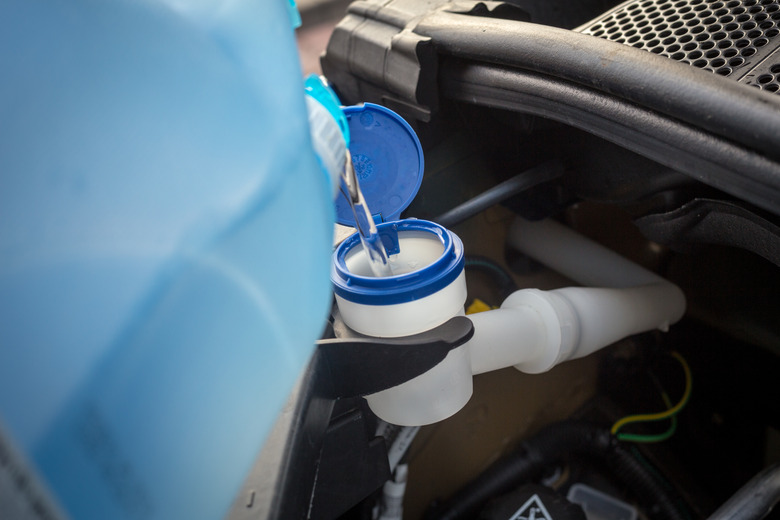How To Recycle An Antifreeze Container
We may receive a commission on purchases made from links.
Antifreeze is an essential element in your vehicle's cooling system. In general, you can't recycle an antifreeze container; it is considered hazardous material and must be disposed of as required by your local hazardous waste facility or recycling center. While antifreeze is necessary to protect the engine from excessive heat and cold, the fluid incorporates ethylene glycol, propylene glycol, or methanol, all of which are toxic to humans, pets, wildlife, and fish.
Disposing of Antifreeze
Disposing of Antifreeze
Antifreeze is dangerous. It has a sweet flavor that attracts children, pets and wildlife, but the effect of ingesting antifreeze is all too often fatal. Once metabolized in the body, it leads to kidney damage and failure. Quick treatment by dialysis is an effective method of removing the toxin from the bloodstream and kidneys.
Depending on your local regulations, you can usually dispose of used antifreeze in the old antifreeze container or clean plastic milk or water jugs. Put on gloves, a mask and safety goggles before pouring the used fluid through a funnel and into the container. Put the cap on the container to prevent spills.
Clearly label the containers as used antifreeze and include the brand if possible. In addition, if the antifreeze is contaminated by oil or other fluids, it should be clearly labeled as contaminated so the facility can dispose of it properly. Secure the containers in the trunk or truck bed and take them to the hazardous waste facility as soon as possible. Avoid storing used antifreeze at home.
Cleaning Antifreeze Spills
Cleaning Antifreeze Spills
Changing the antifreeze often results in small spills. Use dedicated items, such as a drain pan and funnel, when changing the antifreeze. Store these in a locked cabinet or shed when not in use.
Keep children and pets away from the vehicle while you're changing the fluids. Put a ground cloth or cardboard under the drain pan before emptying the radiator. Pour the used antifreeze into a container; don't mix the antifreeze and radiator flush chemicals in the same container.
Spread sand or clay kitty litter over any spills and allow it to soak up the liquid for several hours. Sweep it up and put it into a trash bag and then into the garbage can unless otherwise directed by your refuse company. Mix dishwashing liquid and hot water in a bucket or use powdered laundry detergent to scrub the concrete and remove any remaining traces of antifreeze. Rinse and allow the area to air dry.
Recycling an Antifreeze Container
Recycling an Antifreeze Container
Recycle the antifreeze container by using it to transport used antifreeze to the appropriate facility. Alternatively, some agencies recommend rinsing the container thoroughly, closing it with the safety cap and putting it in the garbage can for pickup on trash day. Don't pour the rinse water into a gutter, a storm drain, or a sink that empties into a septic tank.
Never use an antifreeze container to store any other fluids or drinking water. If using the container to carry a water and antifreeze mixture for your radiator, such as on a long trip, label it clearly and keep the safety cap on it to avoid any chance of accidental ingestion by humans or pets. Secure it in the trunk or truck bed to keep it out of reach of passengers and children.
Disposing of Other Hazardous Waste
Disposing of Other Hazardous Waste
Other hazardous waste has similar issues. Used motor oil, brake fluid and transmission fluid should also be poured into containers and disposed of according to local regulations. When in doubt, contact the local municipal recycling or refuse agency for specific details on proper disposal and/or recycling.
References
- UNC Institutional Integrity and Risk Management Environment, Health and Safety: Antifreeze
- Purdue University: Antifreeze Is Poisonous to Pets and Humans, So Why Keep It Around?
- The Blue Ridge Poison Center: Poisoning Hazards: Fall and Winter
- Colorado Springs Water Resources Engineering: Proper Disposal: Oil and Automotive Fluids
